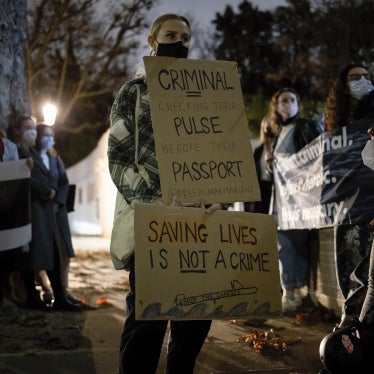Thank you, Mr. President.
For the Convention on Cluster Munitions to succeed, countries must implement it at the national level. They can do so through legal, administrative, and other measures. In particular, they should adopt national legislation.
Legislation advances universalization because for many states, it is a prerequisite to joining the treaty. It promotes the compliance of States Parties obliged by Article 9 to adopt implementation measures. Furthermore, strong laws can bolster the norm against cluster munitions, discouraging future use, even by states not party. Taking a clear stand against cluster munitions is critical at a time of ongoing use.
Strong legislation penalizes violations of the convention’s prohibitions. It ensures a state fulfills stockpile destruction, clearance, victim assistance, and reporting duties. It applies to explosive bomblets, covers corporations and individuals, and establishes extraterritorial jurisdiction.
In statutes as well as statements, countries also should clarify their positions on interpretive issues related to the prohibition on assistance. States should ban transit of cluster munitions through and hosting of foreign stockpiles in their territory. They should prohibit investment in cluster munition production. They should ensure that the convention’s prohibitions, especially on assistance, apply even in joint military operations with states not party.
Since the First Review Conference, three countries—Bulgaria, Mauritius, and Togo—have passed new laws to implement the convention. Their statutes include certain components of strong legislation, thus providing fresh precedent on which other states can draw.
But three new laws in 12 months is far from sufficient. Only 27 of 100 States Parties have enacted specific statutes to implement the convention. While an additional 31 States Parties contend pre-existing laws are adequate, more than 40 percent of States Parties lack any legislation. We urge these states to adopt laws in the coming year.
We also call on countries to strengthen weak implementation legislation. For example, Canada’s new government should amend its 2014 statute in order to prohibit assistance with the use of cluster munitions in joint military operations.
Countries drafting legislation can refer to the Human Rights Watch paper, distributed this week, that lays out essential components of strong legislation and provides examples of positive precedent. The Cluster Munition Coalition has endorsed this list, and we thank the convention’s coordinator for national implementation measures for referencing it as one of the key models for legislation, along with those disseminated by the ICRC and New Zealand.
Madam Coordinator, we thank you for the excellent report on the recent Geneva workshop that you presented today. The Cluster Munition Coalition undertakes the following activities listed in your report: synchronizing outreach on this convention and on the Mine Ban Treaty; promoting the use of model legislation; offering tailored advice to individual states; promoting the prohibition on investments in the production of cluster munitions; and collecting and sharing data through the Cluster Munition Monitor. We stand ready to collaborate on additional ideas you listed, such as reaching out to the Inter-Parliamentary Union, and to help any state seeking assistance during its legislative process.
Thank you.








